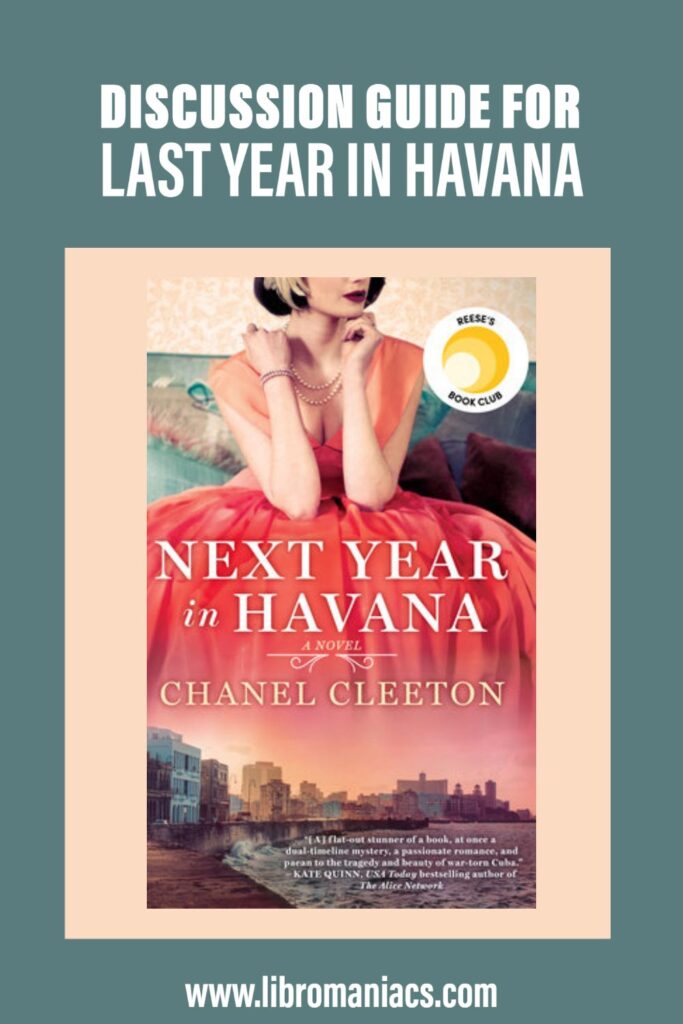Next Year in Havana explores Cuban history through the stories and romances of two women, Elisa Perez and her granddaughter Marisol Ferrera. The story takes us through their rich personal lives filled with romance, mystery, and nostalgia. This provides lots of great opportunities for discussion, so use our Next Year in Havana book club questions to help you dive in.
Elisa Perez’s story begins in 1958 Cuba, where she has grown up as the wealthy daughter of a sugar baron, but her life turns upside down when political turmoil forces her family into exile. Next we are introduced to her granddaughter Marisol, who returns to a Cuba she has come to love through stories and family culture. While there she tries to figure out her place and relationship to Cuba. Both women’s lives are forever changed by love affairs, politics, and their cultural identity.
This Next Year in Havana discussion guide includes question prompts, a book synopsis, selected book reviews from other readers, and to get your discussion going. When you are looking for your next read, keep scrolling to find our selection of three books like Next Year in Havana.

(This article contains affiliate links. This means that if you choose to purchase, I’ll make a small commission.)
Next Year in Havana Synopsis
Next Year in Havana, Chantel Cleeton
After the death of her beloved grandmother, a Cuban-American woman travels to Havana, where she discovers the roots of her identity—and unearths a family secret hidden since the revolution…
Havana, 1958. The daughter of a sugar baron, nineteen-year-old Elisa Perez is part of Cuba’s high society, where she is largely sheltered from the country’s growing political unrest—until she embarks on a clandestine affair with a passionate revolutionary…
Miami, 2017. Freelance writer Marisol Ferrera grew up hearing romantic stories of Cuba from her late grandmother Elisa, who was forced to flee with her family during the revolution. Elisa’s last wish was for Marisol to scatter her ashes in the country of her birth.
Arriving in Havana, Marisol comes face-to-face with the contrast of Cuba’s tropical, timeless beauty and its perilous political climate. When more family history comes to light and Marisol finds herself attracted to a man with secrets of his own, she’ll need the lessons of her grandmother’s past to help her understand the true meaning of courage.
10 Next Year in Havana Book Club Questions
- “But then again, what is certain in this world? Governments change, regimes fall, alliances shift. With so much that lies out of our hands, it seems like love is the easiest and only thing worth trusting.”
What did you think about the love stories in this book? Did they strike you as authentic? Did they reflect Cuba in any way?
- “To be in exile is to have the things you love most in the world—the air you breathe, the earth you walk upon—taken from you. They exist on the other side of a wall—there and not—unaltered by time and circumstance, preserved in a perfect memory in a land of dreams.”
Do you think Elena’s memories of Cuba were influenced by the fact she was exiled rather than leaving of her own desire? How would that influence her memories and feelings towards Cuba?
- What do you think the future holds for Marisol and Luis? Will their passion burn out or their love endure? Do you think they will ever return to Cuba?
- “I walk down these streets, and I look out to the sea, and I want to feel as though I belong here, but I’m a visitor here, a guest in my own country.” Luis takes my hand. “Then you know what it means to be Cuban,” he says. “We always reach for something beyond our grasp.”
What did you learn from Luis and Marisol about what it means to be Cuban? - What does Luis struggle with when he’s deciding whether or not to leave? Can he do more or less good for Cuba if he goes?
- Do you think Pablo did the right thing by letting Elena think he was dead? Why or why not?
- Were you surprised to find out Elena and Pablo had a child, or did you see it coming?
- “Loyalty is a complicated thing — where does family fit on the hierarchy? Above or below country? Above or below the natural order of things? Or are we above all else loyal to ourselves, to our hearts, our convictions, the internal voice that guides us?”
The characters in this book encounter a lot of questions surrounding loyalty, to their family, their country, to their lovers. How do they reconcile these different loyalties during these turbulent times? - Cuba is used by the communists, the Americans, and other political actors. How do these influence the Cubans? What would freedom really mean for them?
- Did you learn anything new about Cuban history or culture from this book?
Selected Reviews for Next Year in Havana
“This book fails on basically every level. A look at past and present Cuba (through almost identical and wholly unbelievable romances) that is devoid of any nuance, complexity, or a true understanding and appreciation for humanity. If you want 1) ‘Cuban history for Dummies’; 2) the ‘privileged, naive, clueless light-skinned girl falls for dangerous, poor, revolutionary darker skinned activist’ trope; and 3) right wing politics — then ok, do you. I found it incredibly and frustratingly facile and trite.”
“The family saga is told in bold, rich details, so vivid I felt like I was there taking in all the sights and sounds of Cuba. The atmosphere is heavy with foreboding and tension, danger always lurking in the shadows. Love, at times, chooses the most inopportune moments to invade one’s heart, but also has a knack for knowing just the right time and place, knowing somehow, someway that it’s now or never. Both scenarios come with hard choices and consequences.
The book is also very informative, giving readers an up close and personal look at what life is really like in Cuba. While I did find all of this very interesting, at times the ‘lectures’ or history lessons slowed the momentum of the story, but I still think readers need to absorb at least some of this information because this knowledge contributes to the high level of anguish and suspense that builds as the novel reaches its climax.”
“I have mixed feelings on this one. I loved parts & I disliked others. I loved Elise’s story… the struggles she faced in a changing Cuba were heartbreaking. I had a vague knowledge of Cuba’s tumultuous past & present, so I really found that part very interesting. At the same time, I enjoyed learning more about Cuba’s struggles, it felt over done in Marisol’s story. The sentiments became very repetitive which made me lose interest & start skimming. Marisol & Luis’s relationship was another aspect I didn’t like. It seemed forced and tried too hard to mirror Elise’s story.”
3 Books Like Next Year in Havana
If you liked the setting for this book, we have a whole book list featuring fiction and non-fiction books set in Cuba.
Havana was also a pick for Reese’s book club. If you like her recommendations, we have quite a few guides for Reese’s books club. Some that also include tricky relationships and/or exile include Daisy Jones and the Six, Erotic Stories for Punjabi Widows, How Not to Drown in a Glass of Water, Where the Crawdads Sing, Little Fires Everywhere and Northern Spy.

When We Left Cuba, Chanel Cleeton
Keep reading about the Perez family in Cuba with another novel by Chanel Cleeton. This story follows Elena’s sister Beatriz Perez after their wealthy family’s exile from Cuba. Beautiful and confident, Beatriz is recruited by the CIA to infiltrate Fidel Castro’s inner circle.
Filled with romance and adventure, this book is sure to please you if you enjoyed the romance and Cuban history of Next Year in Havana.

The Lions of Fifth Avenue, Fiona Davis
If you liked the dual timeline and family drama of This Year in Havana, try the Lions of Fifth Avenue. There is a book theft and mystery at the heart of the book. It follows Laura Lyons in 1913 and her granddaughter Sadie Donovan in 1993. These women are both connected to each other through their family relationship but also the New York Public Library, where some book thefts occur in both timelines.
In addition to the mystery, book also carries themes of female empowerment, family intrigue, sacrifices, and secrets.
And if you are a sucker for books about libraries and librarians, we have a whole book list for that.

The Summer Country, Lauren Willig
Set in 1854 Barbados, this story follows Emily Dawson, a British Vicar’s daughter, who unexpectedly inherits a dilapidated sugar plantation from her grandfather. What awaits her in Barbados is a mystery, why did her grandfather leave her this, what happened there, why are the neighbors so interested in the property?
Her questions lead Emily on an exploration of the island, culture, history, romance, and politics, and her family’s history that will bring her to question everything she thought she knew about herself and her family.
Have a listen on Audible. Try audio books for free for 30 days.
Share these Next Year in Havana book club questions with your friends:

